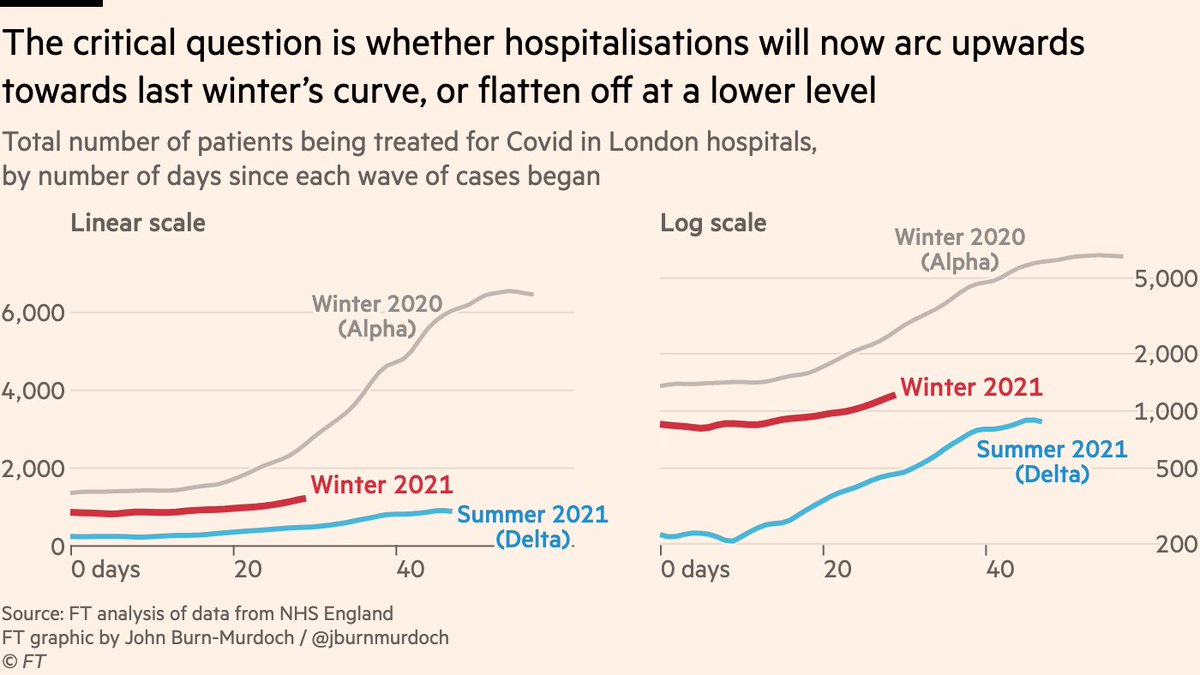NEW: weekly breakdown of hospital patients being treated *for* Covid vs those *with* Covid as an incidental finding is out.
Here’s London:
Though incidentals are still rising at unprecedented rates, there is also a clear and steep rise in patients being treated for severe Covid
Here’s London:
Though incidentals are still rising at unprecedented rates, there is also a clear and steep rise in patients being treated for severe Covid

Comparing the current rise to the Delta wave side-by-side, we can see that although there are far more "with, not for Covid" incidentals this time around, the number of patients being treated for Covid is rising faster than it did in the summer 

But the summer Delta wave never came close to overwhelming the NHS, so key question is how this stacks up vs last winter
Numbers still well below last Christmas, and recent uptick is clearest on a log scale. Long way to go to approach Alpha wave, but direction of travel is clear
Numbers still well below last Christmas, and recent uptick is clearest on a log scale. Long way to go to approach Alpha wave, but direction of travel is clear

Here’s another way of looking at it:
The total number of Covid-positive patients does slightly overstate the severity of the current wave as far as hospitals go, but the "for Covid" line is still clearly bending upwards
The total number of Covid-positive patients does slightly overstate the severity of the current wave as far as hospitals go, but the "for Covid" line is still clearly bending upwards

We’ll have more on the hospital situation later today
All in all, I’d say this is a decent illustration of what people have meant by "a small percentage of a large number can still be a large number".
We’re still way off last winter, but numbers with severe disease are growing, and not especially slowly.
We’re still way off last winter, but numbers with severe disease are growing, and not especially slowly.
("for vs with" data only starts in Jun 2021, so for Alpha wave I’m assuming fixed proportion of patients were being treated primarily for Covid, and that it was in line with the share seen over autumn. This could be wrong, but is unlikely to change the overall picture shown here)
Another bit of context here for considering the Omicron hospital situation over winter:
Hospital staff absences due to Covid have risen very steeply over the last week in London.
(no historical data to compare this with, to my knowledge)
Hospital staff absences due to Covid have risen very steeply over the last week in London.
(no historical data to compare this with, to my knowledge)

An important addition here from @VictimOfMaths [and the brilliant Dan Howdon, formerly of Twitter]:
These figures undercount the total number or "with Covid" incidentals. Doesn't change the overall message but adds important context
These figures undercount the total number or "with Covid" incidentals. Doesn't change the overall message but adds important context
https://twitter.com/victimofmaths/status/1473994916032389124
• • •
Missing some Tweet in this thread? You can try to
force a refresh















